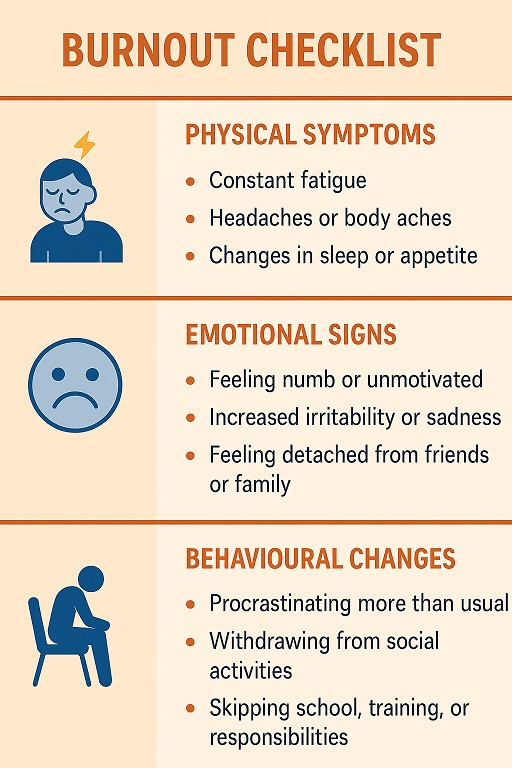Summary:
Many young people in Singapore experience burnout due to academic pressures, strict routines, and high expectations. This exhaustion affects their mental and physical well-being, often going unnoticed until it becomes overwhelming. Recognizing burnout early is crucial, and small steps like labeling emotions, creating gentle routines, and seeking support from a trusted friend, a school counsellor, or an anonymous mental health chatbot like Ommu can help manage stress and improve resilience.
You wake up exhausted, even after a full night’s sleep. Your body feels heavy, your mind foggy. School feels like a never-ending loop—an exhausting cycle of deadlines, lectures, and assignments that leave little room to breathe.
The weekend comes and goes, but it barely makes a dent in your stress. Instead of feeling rested, you might feel on edge, irritable, detached, or just numb—and often, you can’t quite put your finger on why.
If this sounds familiar, you’re definitely not alone. Whether you’re dragging yourself through the intense demands of JC, racing against tight poly deadlines, adapting to the strict routines of National Service (NS), or juggling the challenges of uni coursework and exams, many young people in Singapore are quietly battling burnout. It’s often invisible to those around you, but the impact is very real.
The good news? Burnout isn’t permanent—and there are ways to spot it early and take steps to recover before it gets worse. Recognizing burnout is the first step to reclaiming your energy, motivation, and peace of mind.
🧠 What Is Burnout, Really?
Burnout isn’t just about feeling tired. It’s a full-body warning sign that your stress levels have been too high for too long. When your mind and body hit their limits, it shows up in ways you might not expect.
According to the Mayo Clinic Health System, emotional exhaustion can lead to anxiety, apathy, depression, and a lack of motivation—clear signs that stress has been building unchecked.[1]
You might feel emotionally flat, physically drained, or mentally foggy, like your brain’s running on empty. The Newport Institute describes emotional burnout as persistent fatigue, low motivation, brain fog, irritability, and even physical symptoms like headaches or stomachaches.[2]
Although burnout is often associated with adults in high-pressure jobs, it affects students and full-time National Servicemen (NSFs) too—especially in Singapore’s fast-paced, high-expectation environment. The constant pressure to perform academically, socially, and personally can quietly accumulate until it becomes overwhelming.
The tricky part? Burnout rarely shows up all at once. It creeps in slowly, often unnoticed, until your drive disappears or your body starts forcing you to stop.
“As a poly student, I didn’t realise I was burnt out until I started skipping classes—not because I was lazy, but because I just couldn’t bring myself to care anymore.”
— Anonymous, 19, Ngee Ann Polytechnic
This quote is a powerful reminder: burnout isn’t laziness or weakness. It’s deep exhaustion that can make even simple tasks feel impossible.
📈 Youth Burnout in Singapore: Real and Rising
A 2023 study by the Institute of Mental Health (IMH)[3] found that 1 in 3 young people in Singapore reported symptoms of stress, anxiety, or depression. The main stressors? Academic pressure, uncertainty about the future, and packed schedules that leave little downtime.
For students, burnout often stems from academic overload, where constant studying, projects, and exams become overwhelming. For NSFs, the context shifts but the stress remains. Instead of grades and exams, it might feel like:
- Losing your freedom overnight, suddenly living under strict rules
- Repeating the same rigid routine every day, with little room to breathe
- Feeling emotionally numb or zoning out to cope
- Facing pressure to “man up” and hide how you really feel
“I felt like I had no control. I went from school to Tekong overnight, and suddenly I was expected to just ‘suck it up.’”
— Anonymous, 18, NSF
No matter if you’re in a classroom or a camp, burnout is very real. It impacts much more than just your energy levels—it changes how you think, feel, and connect with the world around you.
⚠️ Early Signs to Watch For
Burnout doesn’t always look dramatic or obvious. Often, it sneaks up in subtle ways—how your body feels, how your thoughts race or stall, or how you react to everyday situations.

✅ Quick Self-Check: Are You Burning Out?
Take a moment. How many of these feel true for you?
📝 I feel emotionally drained at the end of most days.
📝 I find it hard to get excited about things I used to enjoy.
📝 I feel like I’m just going through the motions.
📝 I’ve been more forgetful or making more mistakes than usual.
📝 I feel overwhelmed, even by small tasks.
If you checked 3 or more, your body and mind might be warning you. Burnout isn’t a sign of weakness—it’s a signal. And signals deserve attention.
🛠️ How to Start Feeling Better
You don’t have to wait until things fall apart. Small steps make a big difference. Try one or two of these today:
1. Label What You’re Feeling
Sometimes, just naming your emotions can ease their weight. Instead of brushing feelings aside with “I’m fine,” try being honest with yourself:
👉 “I’m tired and stressed from all these deadlines.”
👉 “I feel overwhelmed and disconnected from the people around me.”
Putting words to your feelings helps your brain make sense of what’s happening and gives you a starting point for managing stress.
2. Create a Gentle Routine
A consistent daily rhythm can soothe your nervous system and reduce stress. This doesn’t mean strict schedules—think gentle, predictable habits like:
- Waking and sleeping around the same times every day, even on weekends
- Eating balanced meals at regular intervals to fuel your body
- Taking short breaks throughout your day, especially before feeling completely fried
3. Set Tiny, Win-able Goals
When burnout makes big tasks feel impossible, shrink them into bite-sized pieces. For example:
- “Open my notes and review just one page.”
- “Reply to one message from a friend.”
- “Wash my face and then take a five-minute rest.”
Each small win rebuilds your momentum and gives you a sense of accomplishment.
4. Talk It Out (Even Anonymously)
Feeling seen and heard matters deeply. Whether it’s with a trusted friend, a school counsellor, or an anonymous mental health chatbot like Ommu—you don’t need to bottle up your feelings. Sometimes just putting your thoughts into words can lighten the load.
💬 “Sometimes I just text Ommu when I feel off. Even if it's just venting, it helps me understand what I’m feeling.”
— Anonymous, 17, JC student
💪 Real Strength Is Knowing When to Pause
In Singapore, we hear a lot about grit, perseverance, and resilience. But real resilience isn’t about pushing yourself until you collapse. It’s about knowing when to slow down, when to speak up, and when to take a breather.
Burnout is your brain and body asking for care—not punishment.
📲 Need a Safe Space to Talk?
Ommu is a free, anonymous mental health chatbot made just for young people in Singapore. Whether you're venting, figuring out your feelings, or just need someone to listen—you can chat anytime, with zero judgment.
📲 Start chatting with Ommu now →
🧩 Final Thought: You Deserve Rest, Too
Burnout doesn’t mean you’re weak. It means you’ve been trying for a long time without enough support. You’re allowed to rest. You’re allowed to ask for help. And you’re allowed to take up space—even on your worst days.
Spot the signs. Take the first step. You matter.
Footnotes
Mayo Clinic Health System. Emotional Exhaustion During Times of Unrest. Retrieved from https://www.mayoclinichealthsystem.org/hometown-health/speaking-of-health/emotional-exhaustion-during-times-of-unrest
Newport Institute. Tired All the Time? It Could Be Emotional Burnout. Retrieved from https://www.newportinstitute.com/resources/mental-health/tired-all-the-time/
The Straits Times (2024). "Depression, anxiety, stress: 1 in 3 youth in S’pore reported very poor mental health, says IMH survey" https://www.straitstimes.com/singapore/health/depression-anxiety-stress-1-in-3-youth-in-s-pore-had-had-very-poor-mental-health-says-imh-survey




